So you've watched Forks Over Knives, Cowspiracy, and What the Health. (Oh, um, you haven't!? Go watch them right now! We'll wait.)
You've also followed along with the media coverage of celebrities who've been long-time vegans (thanks, Ellen and Alicia Silverstone!) as well as recent celebrities who made the jump (Ne-Yo, we're impressed!).
And now you're ready to try it for yourself.
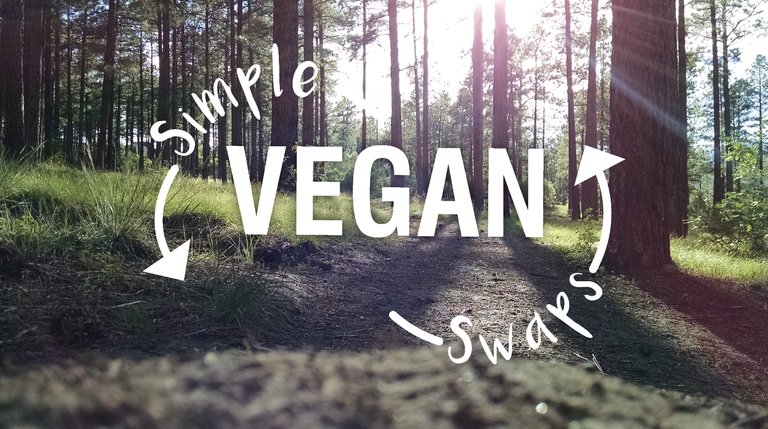
But veganism is so extreme!
Calm yourself. It really isn't!
The thought of going vegan sure seems overwhelming, but it's probably not as difficult as you'd think. In fact, here are just 6 super simple swaps you can make each day that will help you slay veganism. (And we say 'slay' in the most peaceful sense of the word. Really. We are vegans, after all.)
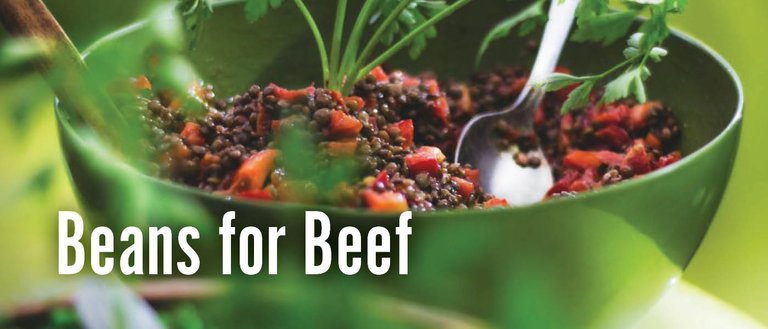
1. Swap Beans for Beef
First of all, to be clear, veganism is a lifestyle, not a diet. All vegans eat a plant-based diet, but not all plant-based dieters are vegan. Clear? Crystal.
That being said, each day you get three opportunities to make a choice between the vegan option or an option which perpetuates systems of cruelty. So, to remove cruelty from your plate, swap beans in place of beef, tofu instead of turkey, seitan rather than chicken, and—well, you get the idea. There are just so many alternatives to animal flesh out there that are both nutritious and delicious that you have no excuse for continuing to eat animal!
Eating a plant-based diet is not about what you can't have; rather, it's about what you're making room for in place of meat. Indeed, once you remove the same few animal proteins from your diet, you'll find that there are dozens—no, hundreds—of plant-based proteins that can be introduced into your diet to replace meat. (Foods you never even heard of before!)
So even if you don't like something new, there's plenty more out there that can satisfy you (and do give it time, because taste-buds mature and you'll soon be loving foods you never thought you would). So leave animals off your plate and skip the beef...and chicken...and pork...and turkey...and fish...and deer...and rabbit...heck, let's save some time: if it's sentient, don't eat it!
Quick and Easy Resources | Alternatives to Meat
- 21 Ingenious Alternatives to Meat (Buzzfeed)
- The Ultimate Guide to Vegan Meat and Meat Substitutes (One Green Planet)
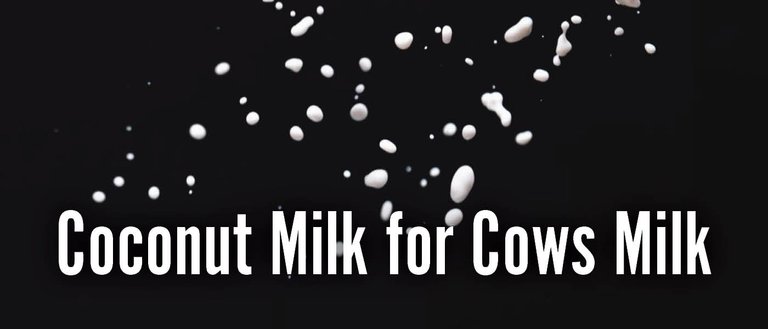
2. Swap Coconut Milk for Cow's Milk
While we're on the topic of food, it's important to emphasize that the jump from vegetarianism (where you eliminate meat from your diet) to veganism starts with a conscious commitment to removing all animal products from our diets and lifestyles, including dairy and eggs as well as other less obvious food ingredients, like honey.
Dairy and egg production is just as cruel as (and sometimes more so than) farming animals for meat. Not to mention that these food groups aren't actually healthy for you. Eggs, for example, are the most concentrated source of cholesterol in the diet! But there are many different ways to replace an egg when cooking, with a range of alternatives depending on what purpose an egg would serve in a recipe.
Now, why dairy-free? Because dairy is seriously scary!
"In reality, the daily practices of most dairy farms are more distressing than those of meat production. A mother cow only produces milk when she gets pregnant. So, starting from the age of 15 months, she will usually be artificially inseminated. Farmers mechanically draw semen from a bull, and then force the female cow into a narrow trap, known as a “cattle crush”, where they will brutally impregnate her."
The Guardian, Opinion, March 30, 2017
Nope, there's no such thing as dairy from "happy cows." So ditch honey, eggs, and dairy and sip on some refreshing and wholesome plant milks. Uncover the full spectrum of flavors: from macadamia nut milk to coconut milk, to hemp milk and pea milk...just name a plant and someone has surely tried to milk it! (And be happy someone else did all the leg work so now you can drink it worry-free!)
Quick and Easy Resources | Alternatives to Dairy + Eggs
- Top 9 Plant-based Egg Substitutes for a Healthy Diet (Ordinary Vegan)
- 10 Great Reasons to Ditch Dairy (One Green Planet)
- Why is Honey Not Vegan? (The Vegan Society)
- Sneaky Non-Vegan Ingredients (The Spruce)

3. Swap Pleather for Leather
Once you've got the food situation under control, your next task is to swap animal products out of your wardrobe, decor, and beauty regime and replace them with cruelty-free and vegan alternatives.
As mentioned above, veganism is a lifestyle, not a diet. There are people who have eliminated animal products from their diet primarily for health reasons, but still sit on leather couches, walk on sheepskin rugs, wear silk robes, and clean themselves with soap made with goats milk and honey. They are not vegans.
Vegans eliminate all forms of animal exploitation, abuse, and cruelty from their day-to-day lives. This means forgoing the leather car interior for fabric; covering up with plant-based fabrics instead of wearing animal skin (e.g., leather, suede, silk, wool, alligator/crocodile skin, fur, etc.); and using only plant-based personal care and cleaning products.
Often created as a by-product of the meat industry, parts of animals are now commonly used to create our home decor and clothing. Leather La-Z-Boy? Nope. Swap the sticks-to-your-skin leather chair for luxurious linen. Silk sheets? How about organic bamboo sheets that are so soft you'll feel like you're sleeping on a cloud!
Now think about what you're wearing or carrying on you this very moment. Are you wearing a belt? Shoes? Are they made with leather? Those fur-trimmed boots surely aren't vegan, nor is that down feather coat.
And don't forget ingredients in your personal care and cleaning supplies. First things first, you should immediately avoid buying from brands that test on animals. Did you know...
"Over 100 million animals are burned, crippled, poisoned, and abused in US labs every year."
DoSomething.org
Animal testing is cruel, not entirely accurate for human comparison, and conducted sometimes for something as trivial as a new shade of already proven safe eye-shadow. There are much more efficient and accurate alternatives to animal testing.
Keep in mind, now, that just because something is labeled as "cruelty free" for not testing on animals, that doesn't necessarily mean animals weren't used for ingredients. Animal bits, parts, and excretions make their way into our soaps, shampoos, conditioners, toothpaste, deodorant, and just about every other product you might find in a bathroom or broom closet! You can switch to do-it-yourself personal care and home cleaning products, or just look for brands that advertise as vegan (you can usually find it labeled on the bottle).
When there are abundant vegan and cruelty-free alternatives (faux fur is fabulous and vegan-friendly lip balm is just a smooth!), there's no reason to go on using animals for our material pleasure.
Quick and Easy Resources | Vegan Products + Materials
- Cruelty-Free Fabric Guide (The Compassionate Closet)
- 101 Cruelty Free Makeup Brands (Cruelty-Free Kitty)
- Beauty Products, What to Look For (Alive)
- Vegan-izing Your Home (Vegan Mainstream)
- Vegan on a Budget: Make Your Own Cleaning Products, Guaranteed Cruelty-Free (Well Vegan)
- Homemade Vegan Beauty Products (Ela Vegan)
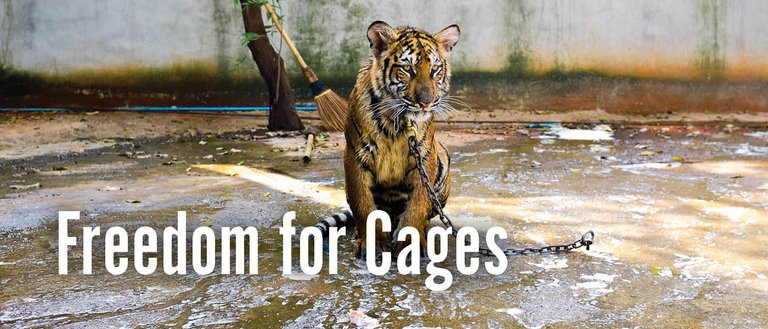
4. Swap Freedom for Cages
Food: check. Material goods: check. Entertainment and exploitation?
It's devastating, but animals are exploited and abused regularly in captivity and in the wild.
Regardless of the situation, no animal—human or non-human—should be enslaved, kept in cages, or otherwise restrained from living their life freely. Be it a zoo, marine park, circus, farm, animal testing lab, or any other scenario, any experience that eliminates an animal's right to their own bodily autonomy—that is, the ability to decide what happens to them, and not be exploited by humans—is an experience you shouldn't be supporting.
We need to get animals out of laboratories, and we also need animals out of cages, pens, and aquariums at zoos and marine parks. Despite defending that they function with a conservation mission, most zoos and aquariums (and especially marine theme parks like SeaWorld), do not have the animals' best interest in mind.
"The use of animals as 'entertainers' removes animals from their natural habitat; deprives them of the ability to freely engage in instinctual behaviors; often involves cruel training methods; desensitizes both children and adults to animal mistreatment; and does not adequately address the real conservation threats that face animals in the wild."
Wildlife-Rescue, Animals in Entertainment
If you are passionate about animals, your money can really be better spent through donations to animal organizations rather than visiting zoos or other animal parks.
Also beware of "wildlife tourism." Swimming with the dolphins, playing with monkeys, riding elephants, feeding tigers...they all sound like exhilarating experiences on the surface, but they're actually cruel and irresponsible operations where animals are held captive and forced to act and perform against their will. (Kudos to TripAdvisor for finally banning all ticket sales to animal attractions!) So skip the safari and the animal excursions and opt for a nice hike or swim instead.
Animals aren't sport, either. Animal fighting, rodeos, racing, and hunting (among other animal 'sports') are all violent and sadistic hobbies that lead to severe injuries and animal fatalities. How about a game of volleyball instead, eh?
Of course, just because you choose not to participate in animal exploitation doesn't mean you have to separate yourselves entirely from other animals. Animal education is a hugely significant factor in fostering respect for animals. It's still possible to learn about and show reverence for animals in appropriate ways.
You can do this either by flipping on a wildlife documentary, by observing animals in their natural habitats (from a safe distance—both for your benefit and theirs!), or by supporting animal sanctuaries that have rescued animals from zoos, racing, fighting, or other exploitative experiences. (Hopefully one day there won't be any scenario from which animals will need to be saved in the first place!)
No animal deserves to be forced to entertain people. So be sure to avoid the broader spectrum of animal exploitation that is animal-based entertainment.
Quick and Easy Resources | Ending Animal Exploitation
- Entertainment (Animal Equality)
- Wildlife Tourism: The 10 'Cruelest' Animal Attractions, Revealed by World Animal Protection (Huffpost)
- Animals in Film and Television (The National Humane Education Society)
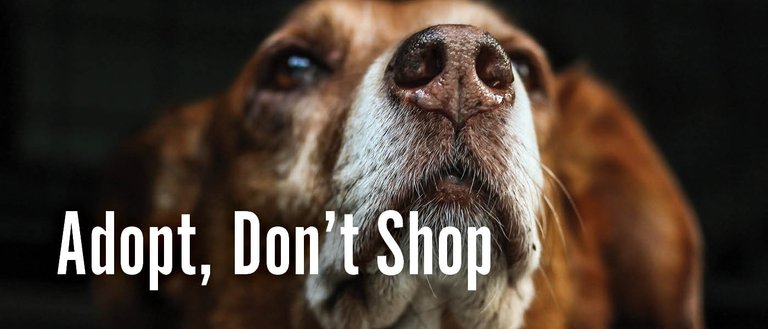
5. Adopt Don't Shop
According to 2017 research, there are 751,000 animals held captive in accredited zoos, marine parks, etc. in the world. (*The definition of "accredited" is unclear, as is any information about the number of animals held in non-accredited facilities.)
But what about animals that have been domesticated and are kept as household pets? Aren't they also captive?
Some estimates for just the United States put the number of cats and dogs as household pets at 163.5 million—and that's not including birds, rabbits, fish, reptiles, or any other pet animals! How many, do you think, came from puppy mills, pet stores, or other exploitative breeding operations?
Well, there are some unbelievable statistics on cats and dogs purchased and in shelters shared by the American Society for the Prevention of Cruelty to Animals (ASPCA). According to an American Pet Products Association study, "34% of dogs are purchased from breeders, while 23% of dogs and 31% of cats are obtained from an animal shelter or humane society" (source: cited by the ASPCA).
"Every year in Ameica, it's estimated that 2.11 million puppies are sold that originated from puppy mills, while 3 million are killed in shelters because they are too full and there aren’t enough adoptive homes."
DoSomething.org, 11 Facts About Puppy Mills
So if you're in search of an animal to share your life with, please adopt—don't shop.
The hard reality of it is, however, that humans really have no business owning other animals as pets (and don't forget: humans are animals, too). Even using the word "pet" connote's a relationship of superiority. The phrase "companion animal" is preferable as it suggests a more familial relationship.
Ideally, despite the joy our companion animals may invoke, there will be a future when no animal is owned or exploited in any way whatsoever—including as pets. That's a long way off, of course, because our animal shelters are full. But it's a future we can achieve with four steps: Step 1 is to end all animal breeding operations. Step 2 is to continue rescuing animals from shelters until all shelters are emptied. Step 3 is to have all companion animals spayed/neutered. Step 4 is to care for all our animals so they can live out healthy and happy lives.
Just think about all the sweet animals in shelters right now—the old dogs, the injured strays, the lonely fur babies! If you want to help an animal by caring for it, the best way you can achieve this is through adoption, whereas shopping for animals only perpetuates a cycle of animal exploitation.
P.S., did you know that your companion animals can be vegan, too!? Read more about vegan dogs and even the reality of vegan cats—who are "obligate carnivores." Cats need taurine in their diet, which can actually be supplemented [and indeed typically is even supplemented in canned cat food which is so nutrient-deficient!] (source)
Quick and Easy Resources | Companion Animals
- Companion Animals (Animal Welfare Institute)
- 11 Facts About Puppy Mills (Do Something)
- Should Vegans have Vegan Dogs and Cats? (Free From Harm)
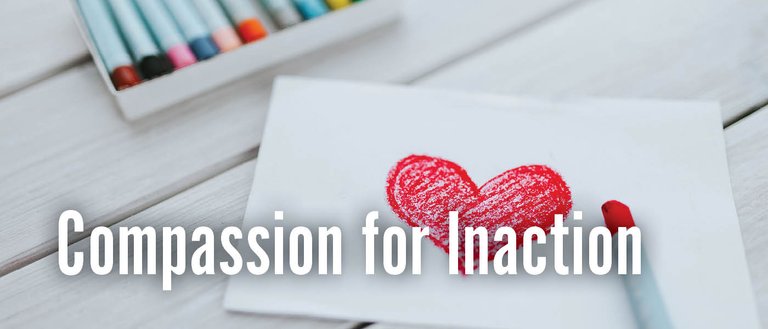
6. Swap Compassion for Inaction
Okay, so in theory this last one's simple. It's a change of mindset. But in reality, it's not like we're born indifferent to animal suffering—rather, we learn to be indifferent. Removing the veil takes determination and a desire to step away from that mindset. We must first want to understand the impacts of our actions before we can hope to live without causing suffering.
As Martin Luther King, Jr., wrote in his famous Letter from a Birmingham Jail:
"Injustice anywhere is a threat to justice everywhere."
We take this to mean that we cannot expect to see an end to racism, sexism, homophobia, xenophobia, ageism, ableism, or any other oppressive behavior or mindset so long as there is exploitation and cruelty on our plates. If the common assumption is that we are superior to animals, what's to say that people won't assume that certain populations are inferior as well? Alice Walker, the famous African-American author of The Color Purple, once said:
"The animals of the world exist for their own reasons. They were not made for humans any more than black people were made for white, or women were created for men.”
At the same time as we learn to respect animals in their own right, we should be conscious of the rhetoric/language we use. They're not "farm animals," they're "farmed animals." We need to start calling things what they are.
It's not pork, it's pig. It's not beef, it's cow. It's not veal, it's a baby. It's not foie gras, it's unethical, inhumane, and atrocious. Calling things what they are helps to break down the mental images that meat and dairy industries have painted. It's not milk, it's cow secretions and pus. They're not eggs, they're chicken periods. Not so pleasant when you think about what it actually is that we're putting in our mouths, huh?
So have compassion. And be mindful of the language you use and the impacts of your actions. You'll soon be on your way to a happier, healthier, more fulfilling life!
Quick and Easy Resources | Compassion
- 7 Ways to Show More Compassion Toward Others (Power of Positivity)
- What Compassion Is (Psychology Today)
- The Ethics of Veganism and Vegetarianism (Ethical Consumer)
That's It?
Yep, that's it! It's a path you have to navigate, of course. You can't just flip a switch and expect veganism to be effortless. You'll have to readjust at first. But overall, it's really a small handful of relatively simple behavior changes that will get you there. And once you've settled in, it becomes second nature. You'll be reaching for the dairy-free milk and butter instinctively.
It's up to you. No one can tell you to be vegan, you have to make that decision for yourself. The best that we can do for you is to share as much information as possible to help you make that decision.
More Resources:
- Animal Rights and Veganism/Vegetarianism (Happy Cow)
I have watched all of those documentaries and they seriously are LIFE CHANGING! I am so proud to be vegan and my body loves me big time for making the switch! Awesome post!!
Isn't it amazing how great you can feel once you go vegan!? And seriously, I had tried to go vegan for years but it wasn't until Forks Over Knives that I finally transitioned!
Congratulations @crunchyvegangal! You have completed some achievement on Steemit and have been rewarded with new badge(s) :
Click on any badge to view your own Board of Honor on SteemitBoard.
For more information about SteemitBoard, click here
If you no longer want to receive notifications, reply to this comment with the word
STOPI actually haven't watch What The Health! Granted it came out after I was already vegan 😁 And Ellen is no longer vegan , I believe. Watched her interview on YouTube after Finding Dori came out. She said she started eating fish again. But she is still an awesome person ❤️
Oh that's heartbreaking news about Ellen! I don't follow her too closely I just know she's a genuine person who was an inspiration to me for going vegan back when. Sad to hear! For someone who has already drank the kool-aid, What the Health is not going to be anything knew :)
Love to watch those documentaries! I have started a my journey to becoming vegan, for my health. There's just some stuff I'm having trouble letting go. Love the post though. Will try some of your alternatives!
The vegan community is so supportive. If you need help with anything in particular, don't hesitate to reach out. But definitely go at a pace that's comfortable to you. You'll find what's right eventually!
This is so well written even non vegan can understand easily.
Thanks for such a nice post about veganism.
upvoted and resteemed
Thank you so much! Those are very kind words!
AMAZING POST @crunchyvegangal all of these swops are so applicable and really if even a small percentage of people started switching their habits, the world as a whole would see such drastic reform! =D